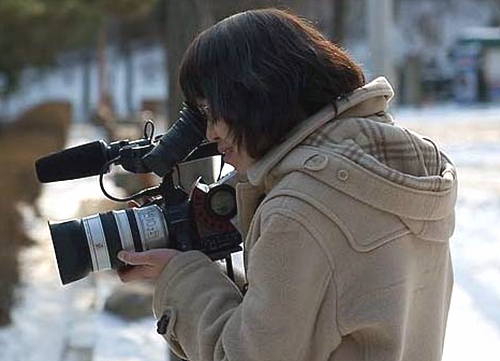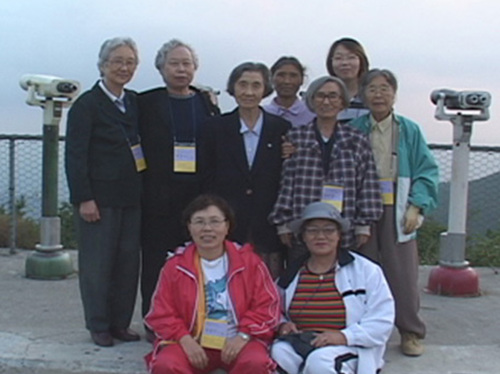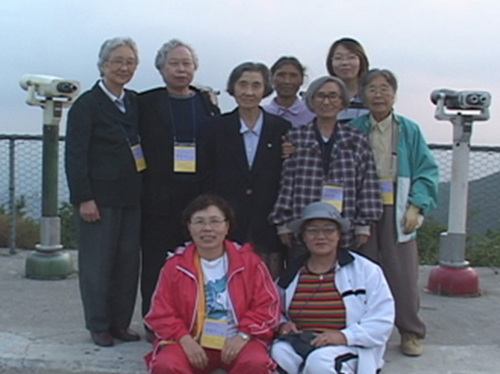6th(2004)
Forgotten Warriors / Ityeojin Yeojeonsa
KIM Jin-yeul
- Korea
- 2004
- 90min
- DV6mmdigital
- color
SYNOPSIS
Forgotten Warriors is a documentary about old Korean ladies who were active as secret agents or partisans after liberation from Japanese occupation and during Korean War. At the age of 15, Park Soon-ja began participating in left-wing partisan activities and was imprisoned. After 10 years in prison, she has devoted her life to activities for reunification such as events for long-term prisoners, demonstrations commemorating two Korean school girls killed by US armored vehicle, and rallies against Korean army’s dispatch to Iraq. Female partisans, whose existence was removed from the history, are still in the battle for reunification.
Kim Jin-yeul, the director, investigates the lives of these women who have painfully struggled for their survival in the modern Korean history. Throughout the film, lives of these women as warriors who were forced to live with both of the North and the South, and wife, mother and bread earner as well are revealed. Park confesses that she was more attracted to partisan activities than what used to be taught to young girls at the time, and that her life as a housewife has been harder than living as a guerilla. By foregrounding women’s life surpressed in or even removed from the South Korea’s modern history, Forgotten Warriors tries to explore the complex zones where history meets women’s experiences. Registering the gender matters in the history, this films differs from Kim Dong-won’s Repatriation, a documentary about long-term prisoners detained for not disavowing their political belief. Also, by discovering the existence of these hidden ladies’ life, it differs from Byun Young-joo’s The Murmuring that depicts comfort women’s life in the Korean modern history. (Kwon Eun-sun)
Kim Jin-yeul, the director, investigates the lives of these women who have painfully struggled for their survival in the modern Korean history. Throughout the film, lives of these women as warriors who were forced to live with both of the North and the South, and wife, mother and bread earner as well are revealed. Park confesses that she was more attracted to partisan activities than what used to be taught to young girls at the time, and that her life as a housewife has been harder than living as a guerilla. By foregrounding women’s life surpressed in or even removed from the South Korea’s modern history, Forgotten Warriors tries to explore the complex zones where history meets women’s experiences. Registering the gender matters in the history, this films differs from Kim Dong-won’s Repatriation, a documentary about long-term prisoners detained for not disavowing their political belief. Also, by discovering the existence of these hidden ladies’ life, it differs from Byun Young-joo’s The Murmuring that depicts comfort women’s life in the Korean modern history. (Kwon Eun-sun)
PROGRAM NOTE
Forgotten Warriors is a documentary about old Korean ladies who were active as secret agents or partisans after liberation from Japanese occupation and during Korean War. At the age of 15, Park Soon-ja began participating in left-wing partisan activities and was imprisoned. After 10 years in prison, she has devoted her life to activities for reunification such as events for long-term prisoners, demonstrations commemorating two Korean school girls killed by US armored vehicle, and rallies against Korean army’s dispatch to Iraq. Female partisans, whose existence was removed from the history, are still in the battle for reunification.
Kim Jin-yeul, the director, investigates the lives of these women who have painfully struggled for their survival in the modern Korean history. Throughout the film, lives of these women as warriors who were forced to live with both of the North and the South, and wife, mother and bread earner as well are revealed. Park confesses that she was more attracted to partisan activities than what used to be taught to young girls at the time, and that her life as a housewife has been harder than living as a guerilla. By foregrounding women’s life surpressed in or even removed from the South Korea’s modern history, Forgotten Warriors tries to explore the complex zones where history meets women’s experiences. Registering the gender matters in the history, this films differs from Kim Dong-won’s Repatriation, a documentary about long-term prisoners detained for not disavowing their political belief. Also, by discovering the existence of these hidden ladies’ life, it differs from Byun Young-joo’s The Murmuring that depicts comfort women’s life in the Korean modern history. (Kwon Eun-sun)
Kim Jin-yeul, the director, investigates the lives of these women who have painfully struggled for their survival in the modern Korean history. Throughout the film, lives of these women as warriors who were forced to live with both of the North and the South, and wife, mother and bread earner as well are revealed. Park confesses that she was more attracted to partisan activities than what used to be taught to young girls at the time, and that her life as a housewife has been harder than living as a guerilla. By foregrounding women’s life surpressed in or even removed from the South Korea’s modern history, Forgotten Warriors tries to explore the complex zones where history meets women’s experiences. Registering the gender matters in the history, this films differs from Kim Dong-won’s Repatriation, a documentary about long-term prisoners detained for not disavowing their political belief. Also, by discovering the existence of these hidden ladies’ life, it differs from Byun Young-joo’s The Murmuring that depicts comfort women’s life in the Korean modern history. (Kwon Eun-sun)
Director
-

KIM Jin-yeulKIM Jin-yeul
Born in 1974, Kim Jin-yeul majored in Mass Communications at Daejin University. Her previous film The Wedding Story of a Woman with Disability (1999) was awarded at the 1st Disability Film Festival, The Land Make Rice (2000) was awarded at the 4th Seoul International Documentary Video & Film Festival and Forgotten Warriors (2004).
Credit
- Cinematography Lim Choun-min 임천민, Suk Sun-young 석선영, Kim Ji
- Editor Kim Jin-yeul 김진열



